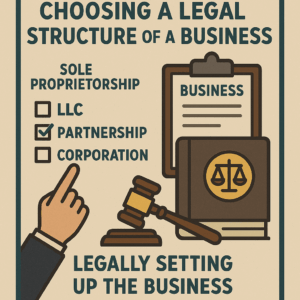
Choosing the Correct Legal Structure for Your Business
Starting a business is exciting, but one of the most crucial early decisions you’ll make is choosing the right legal structure. Your choice affects everything from day-to-day operations to taxes, liability, and your ability to raise money. It’s a foundational decision that deserves careful consideration.
Why Legal Structure Matters
The legal structure of your business impacts:
-
Personal liability: Your level of personal risk if the business faces lawsuits or debts.
-
Taxes: How your business income is taxed, and what deductions or credits are available.
-
Paperwork and compliance: Some structures require more documentation, reporting, and regulatory compliance than others.
-
Ability to raise capital: Certain structures are more attractive to investors and lenders.
-
Long-term growth: Your structure can affect your ability to expand, sell, or pass on your business.
Let’s break down the most common types of business structures and when they make sense.
1. Sole Proprietorship
Best for: Low-risk businesses owned and operated by one person.
-
Pros: Easiest and least expensive to set up. Complete control. Tax simplicity—income is reported on your personal tax return.
-
Cons: You’re personally liable for all debts and legal actions. Can be harder to raise capital.
Key takeaway: Great for freelancers or solo entrepreneurs starting out, but limited in liability protection and scalability.
2. Partnership
Best for: Two or more owners working together in a business.
-
Pros: Easy to establish. Shared financial commitment and complementary skills.
-
Cons: Joint liability—each partner is responsible for the business debts and decisions of the other. Can lead to disputes.
Types:
-
General Partnership (GP): Equal responsibility and liability.
-
Limited Partnership (LP): One general partner and one or more limited partners with restricted liability and involvement.
Key takeaway: A solid option when co-founding with trusted partners, but make sure you have a detailed partnership agreement.
3. Limited Liability Company (LLC)
Best for: Small to medium-sized businesses wanting legal protection without corporate complexity.
-
Pros: Combines the liability protection of a corporation with the tax benefits of a sole proprietorship or partnership. Flexible management structure.
-
Cons: More paperwork than a sole proprietorship or partnership. Rules can vary by state.
Key takeaway: A popular and versatile structure for many modern businesses, offering a good balance of protection and flexibility.
4. Corporation (C Corp and S Corp)
Best for: Businesses seeking significant investment or planning to go public.
-
C Corporation
-
Pros: Strong liability protection. Unlimited shareholders. Attractive to investors and venture capital.
-
Cons: Double taxation—profits taxed at the corporate level and again when distributed to shareholders.
-
-
S Corporation
-
Pros: Avoids double taxation by passing income through to shareholders. Limited liability.
-
Cons: Strict eligibility requirements (e.g., limit of 100 shareholders, all must be U.S. citizens or residents).
-
Key takeaway: Corporations offer strong growth potential and liability protection, but come with more regulations and costs.
5. Nonprofit Organization
Best for: Mission-driven organizations focused on social, educational, or charitable goals.
-
Pros: Tax-exempt status. Eligible for public and private grants. Limited liability for directors and officers.
-
Cons: Must adhere to strict rules about profit distribution and transparency.
Key takeaway: Ideal if your primary goal is social impact rather than profit.
Final Thoughts
Choosing the right legal structure is not a one-size-fits-all decision. Consider:
-
Your long-term vision
-
Your willingness to handle administrative tasks
-
Your risk tolerance
-
Your funding needs
It’s wise to consult with a business attorney or accountant who can offer advice tailored to your specific situation. The right structure can set the stage for your business’s success—and help you avoid costly mistakes down the line.
For temperature controlled storage or non temperature controlled storage call 607-775-9776 or visit www.laingselfstorage.com. We have locations in Endwell, Endicott, Binghamton, & Conklin and Greene coming soon!
